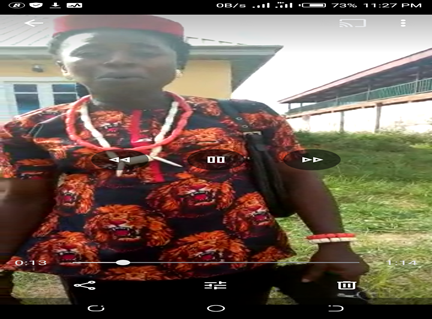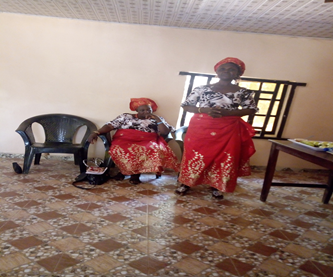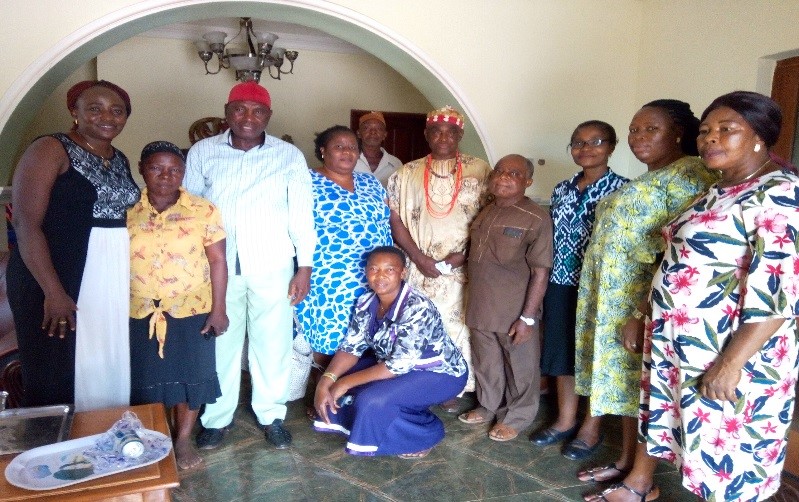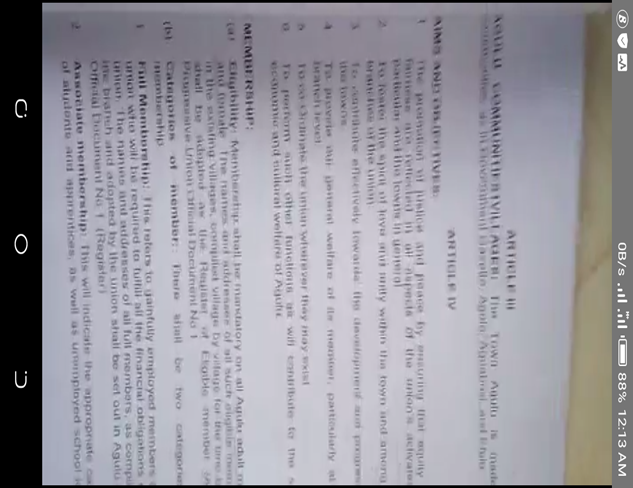Report from January to May 2021
General Information
| Name | Affirmative Action Initiative for Women (NCAA) |
| States | Enugu |
| Report compiled by | Virginia Obianyo |
| Date submitted | 1st June, 2021 |
Activities Implemented
The Crisis -grant funded activities started in Enugu on the 10th of January, 2021 after the planning meeting where the activities to be undertaken were discussed. NCAA used the WHATSAPP and phone text messages to share the information among her members to enlighten the other members across the LGAs on the grant. The first activity was advocacy meetings with state duty bearers from the MDAs and State Task force on COVID 19 where 15 stakeholders were reached and commitments to curate policies and practices that protect and ensure provisions are made for women and girl’s essential needs. This was followed by the conducting of community engagement meeting with traditional leaders, women groups and girls groups advocating for compliance on COVID-19 gendered preventive measures and elimination of SGBV in 12 communities in 6 LGAs. Community Radio Campaign with recorded messages were conducted and aired for 6 weeks from February to March 2021, Community sensitization using town criers to sensitive community members on COVID-19 Preventive measures, Capacity Building on SGBV and laws passed in the state done for 44 traditional leaders across two senatorial zones where the prevalence and incidences of gender violence is on the increase before, during and after COVID 19 Pandemic lockdown, Monitoring, documenting and analysing SGBV and Sharing and distribution of Palliatives to 240 indigent women and girls.
The outcomes of these activities were:
- Availability of documented policies and practices that support provisions for women essential needs.
- Inclusion of 11 women into the community leadership and decision making strata by these traditional leaders, HRH Igwe Hyacinth Ezeh of Ibeagwa –Aka (Igboeze South), he included 4 women, HRH Igwe Ambrose Eke of Igogoro community who included 3 (Enugu – North senatorial zone) and Igwe Onuoha of Agbogugu of Awgu (Enugu West Senatorial zone) installed 4 women as Cabinet chiefs.


Some of the women that were included as cabinet chiefs in Igboeze North and Ehazuabor Nsukka respectively during the project
- Signed commitments /declaration forms to end all forms of Gender based violence in the 12 communities.
- Traditional leaders of 7 communities have so far formed mediation committees comprising of three women, three men and 2 cabinet Chiefs and NCAA Legal team.

Mediation Team of Ibeagwa Aka during the inauguration
- They now settle SGBV cases ranging from widowhood practices, denial of inheritance, domestic violence, ejection; and some have reported and followed up cases of rape in their communities. . For example, HRH Igwe Cletus Okwor of Ehazuabor (Nsukka LGA) and HRH Igwe S.O Itodo (Aji Community) in partnership with NCAA jailed three perpetrators of sexual assault (rape) and they are currently serving their jail terms.
- Four traditional leaders have reviewed their Community bye –laws to include punishments for perpetrators of Gender based violence and women exclusion in community leadership. Such communities include Agulu Ugwuoba community, Nru community, Umuogbo community and Ibeagwa Aka. Nru community amended their bye laws to include that wife battery is liable to pay a fine of fifty-six (56) US dollars for perpetrators

The above photo shows one of the reviewed Community Bye laws for inclusiveness in community leadership
- Advocacy to government stakeholders (MDAs and State task force on COVID 19 Pandemic).
As part of the efforts to ensure that women and girls essential needs are met, NCAA team visited Hon. Commissioners of the Ministry of Gender Affairs and Social Development, Budget and Economic Planning, Finance, Health and the state task force and other allied ministries to document and enforce policies and practices that will reduce minimally the impact of the disease on women and girls. 15 persons were reached.
ANNEX 1 A See the picture gallery for the pictures.
- Community Engagement meetings with community leaders advocating for compliance on gender preventive measures on COVID 19 Pandemic.
These meetings were held in the palaces of the 12 traditional leaders in their communities across the two senatorial zones of Enugu State namely Ehazuabor, Nru in Nsukka LGA, Ogbuodoaba, Ezimo Agu in Udenu LGA, Aji, and Umuiyda in Igboeze North, Uhunowerri and Ibeagwa Aka in Igboeze South, Agbudu and Agbogugu in Awgu, Enugu Akwu Achi and Agulu Ugwuoba in Oji River LGA. Sixty (60) community leaders (24 females and 36 males) were reached with the following agenda:
COVID 19 NCDC protocol and the need to adhere to and enforce them in the communities.
Sexual and Gender based violence. The need to eradicate SGBV because it breeds underdevelopment and conflicts in the communities.
Also traditional leaders were enlightened on some of the laws passed in the state against SGBV. The need to have community bye –laws and the extent of its implementation and to set up committees to monitor, document and handle some of the cultural issues that impede women from participating in community leadership as well as amend the laws to accommodate punishments for offenders and perpetrators.
Responding to above issues raised, traditional leaders listed some of the SGBV that have been stopped such as Girls Enslavement/ dedication to the shrine/idols (Uhunowerri), denial of inheritance(Awgu), Wife inheritance (Ezimo –Agu), wife battering/ domestic violence (Nru), Early marriage(Awgu and Oji River) and rape (Aji and Ehazuabor).
Ten Traditional leaders of 12 visited requested us to organize a training for them on the laws passed in the state against SGBV and other reproductive health rights so as to help them address some of those cultural issues that results in conflict. The outcomes of the meeting was the inclusion of 11 women into the community leadership positions and formation and inauguration of community mediators.
ANNEX 1 B for picture gallery
- Community radio campaign using recorded messages to educate citizens on the peculiar impact of COVID 19 on women and girls arising from SGBV, income loss and high time burden of care giving.
To organize this program, a joint meeting of NCAA, Women groups from the 12 communities was held in partnership with Dream FM presenters to discuss the modus operandi since this a new program. After the meeting, a date was scheduled for recordings. Majority of the hidden obnoxious practices against women and girls were exposed for the attention of the government and the general public. One of such practices was the use of young girls for sex for money. The recorded messages cumulated into 6 episodes. The table below shows the dates and various messages discussed and aired in episodes 1-6.
| Episodes | Topics discussed | Date /Time Aired |
| 1 | Overview of gender based violence and identification SGBV in communities, its impact in the family (Children and women) | 25th February , 2021 at 12.30 – 1.00noon |
| 2 | Causes and why the increase during this COVID 19 and its effects on Income of women. | 3rd March, 2021. 12.30 -1pm |
| 3 | Media messages to be sending to men (fathers, boys)to stop it | 10th , 2021.1.2pm -1.00pm |
| 4 | X-ray rolls to be played by community groups, government, CSO/NGOs, Church, Security Agents and individuals in reducing SGBV | 17th March, 2021. 12.30- 1.00pm |
| 5 | Ways/ channels of getting redress and high burden of care on women | 24rd March , 2021.12.30 -1.00pm |
| 6 | NCDC Protocols | 1st April 2021 12.30 – 1.00pm |
- Community sensitization using town criers in 12 communities namely Nru and Eha-Azuabor (Nsukka), Agulu Ugwuoba and Enugu Akwu Achi (Oji River), Agbudu and Agbogugu (Awgu),, Ogbuodoaba and Ezimo- Agu (Udenu), Umuokpu and Aji (Igboeze North) , Ibeagwa Aka and Uhunowerri ( Igboeze South. Over twelve (12000) community member were sensitized on COVID 19 protocols, SGBV and laws passed against SGBV.
- Two days training workshops was organized respectively for 44 traditional leaders (22 per zone) in Enugu North and Enugu West senatorial zones. They were trained on SRHR, SGBV and laws passed against SGBV in the state. The training was organized to enhance the capacity of traditional leaders to be able to tackle issues on SGBVHTP in their communities.
The outcomes of the training were the inclusion of 11 women as Cabinet chiefs to bring to the notice of the traditional council cases of SGBV, reviewing of community bye laws to include punishments for the Perpetrators of GBV, inauguration and establishment of community mediators, and signing commitments to end SGBV in their communities.
To totally eradicate sexual and Gender based violence against women and girls, the traditional leaders suggested that a wider fora (round table discussions) be organized where women groups, the daughters (Umuadas), town Union Presidents, youths (male and females) will participate to brainstorm and find a lasting solution to the cankerworm. This will be done at LGA levels.
See the picture gallery
- NCAA with support from GFW shared food items to 240 indigent women, girls, Orphan and Vulnerable Children (OVC) and Persons with Disabilities (PWDs) in the 12 communities. Items shared include 10kg of rice, tubers yam, Beans, onions, ingredients for cooking and sanitary items for young girls. See annex – for the pictures/ evidence
- Affirmative Action Initiative for Women in collaboration with Traditional leaders and community mediators monitored and is still monitoring the incidences and prevalence of SGBV in the 12 communities. 40 cases ranging from Sexual Assault/abuse, Denial of right to inheritance, wife battering, Ejection of Widows and exclusion from voting were recorded, reported and documented. Three (3) of the rape culprits have been prosecuted and jailed, 5 have been so far settled through combined mediation session organized by NCAA, FIDA, CIRDDOC and traditional leaders while 32 other are still ongoing at different stages.
| S/No | What Was Done | Output/Outcome | |
| Advocacy | |||
| 1 | Conduct high level physical meeting with duty bearers in the Ministry of Gender Affairs, Health, Budget and Economic planning, Finance and State task force on COVID 19 to curate policies and practice | Hold meetings with them on the need to curate policies and practice to ensure provisions are made women and girls essential needs | 15 people reached. Commitments to document and made available policies that will ensure that |
| 2 | NCAA delivering Community engagement with traditional leaders advocating for Gendered preventive measures and SGBV | Conducted community engagement with 12 traditional leaders across two senatorial zones namely Enugu North and Enugu West senatorial zones | 60 community leaders were engaged on COVID 19 protocols 11 women included in their community leadership positions Community monitors established to monitor and report any form of SGBV, |
| Traditional and New media Engagement | |||
| 3 | Community radio campaign using recorded messages | Visited the communities with Dream FM producer to recorded the voices of women groups on SGBV | 6 episodes aired from 25th February to 1st April, 2021 at Dream FM 92.5. Over 4 million persons were reached in Enugu state and beyond |
| 4 | Community sensitization using town criers in 12 communities | Mobilized and educate community town criers to sensitize community members, market people and in other public places | 12,000 community members were sensitized using town criers in the markets, public places and households. |
| Education / Empowerment | |||
| 5 | Capacity building for traditional leaders in Enugu North and West senatorial zones | Organized 2 day training workshops respectively for 44 traditional leaders(22 per zone) on SRHR, SGBV and laws passed in the state | The trained traditional leaders signed commitment s to end all forms of SGBV, reviewed their respective community bye- laws Established community mediators |
| 6 | Palliatives sharing in 12 communities | Mobilized 240 indigent women, girls, PWDs and OVC in partnership with traditional leaders and leaders of women groups. Purchase of items for distribution | Shared food and other items to 240 indigent women and (20 per community) |
| 7 | Monitoring and Evaluation | Monitor SGBV report and follow up SGBV by Community mediators in the 12 communities. | Monitored, reported and followed- up to litigation process in court (Enugu North, Enugu West senatorial zones |
Implementation Challenges
- Fluctuation of exchange rate in the markets price of the palliative items.
- Increase in transportation price due to increase in pump price of fuel in the country
- Bad terrain/ bad roads of most communities during engagement meetings and distribution of palliative support items.
- Too many poor people not covered by palliative distribution because of limited fund.
Recommendations for Next Implementation Period
- Extension of the capacity building to cover women especially Umuadas (daughters of the community), youth, faith based organizations, more traditional leaders to increase awareness on the laws.
- Scale up palliatives sharing to cover more indigent persons especially widows, OVC and PWDs.
- Extension of the project activities to cover more communities. Out of 472 communities in the state, only 12 were served.
- Capacity building for community mediators on conflict management and Alternative dispute resolution strategies to stop GBV in communities.
